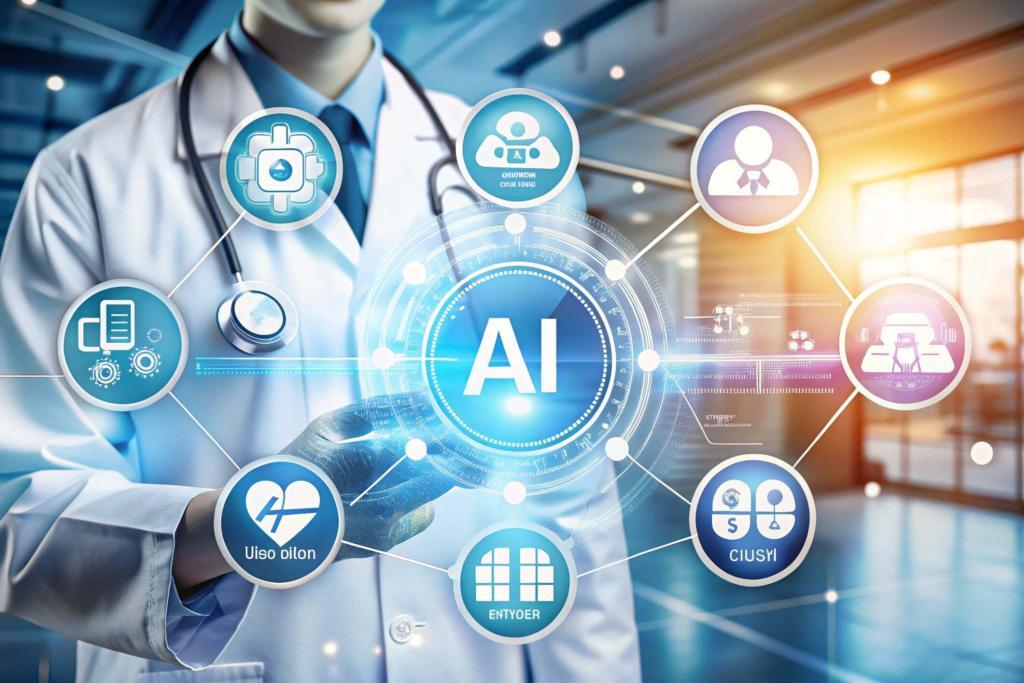Telemedicine is a modern healthcare approach that uses technology to facilitate remote clinical services. The benefits of this approach have become increasingly evident, with improved access to care, better support for chronic conditions, and greater flexibility leading to enhanced patient satisfaction.
When we throw artificial intelligence (AI) into the mix, telemedicine solutions become even more efficient, unlocking new possibilities in the healthcare sector.
So, how is AI transforming telemedicine and patient engagement?
Keep reading to learn the ins and outs of AI in telemedicine, where we’ll explore the top AI-powered solutions in modern healthcare and their role in enhancing patient engagement.
Top AI-Powered Solutions in Telemedicine
To better understand how AI is transforming telemedicine, let’s take a look at 3 AI-powered solutions that are being leveraged today.
Virtual Health Assistants
AI virtual assistants are the key to improving communication with patients. They offer advice, answer questions, schedule appointments, remind users to take medication, and more.
For instance, let’s say a patient messages an AI chatbot and asks them about possible side effects of their prescription or whether certain services are covered by their insurance. The virtual assistant will quickly respond, providing them with the information they require. This reduces wait times and ensures patients have access to accurate information.
Due to their ability to handle routine administrative tasks, such as answering user queries, AI virtual assistants are becoming increasingly popular in the healthcare industry, with the Global Health Intelligent Virtual Assistant Market expected to reach a market value of USD 20,901 million by 2032.
Remote Patient Monitoring
Remote monitoring devices help healthcare providers monitor vital signs such as heart rate, blood pressure, and glucose levels. To improve patient outcomes, AI can be incorporated into these devices, using machine learning algorithms to analyze data in real time.
This enables devices to predict potential health issues, facilitate quick intervention, and enhance long-term health outcomes. Let’s take a look at how this works.
Let’s say a patient with heart complications uses a remote monitoring device to track their heart rate, blood pressure, and respiratory rate. If the algorithm detects irregular patterns, it will alert the doctor, who will then use this information to promptly address the situation.
Personalized Treatment Plans
AI is a great tool for creating personalized treatment plans that are tailored to the unique needs of each patient. One of the ways AI enhances treatment plans is by maximizing the benefits of electronic health records (EHRs). How?
To start, EHRs give healthcare professionals real-time access to a patient’s medical history, demographics, test results, treatment plans, and more. When AI is applied to this system, it analyzes data to find patterns and trends, which can lead to early detection, better diagnosis, and more personalized treatments.
This improves treatment accuracy, reduces the risks associated with adverse reactions, and overall, ensures the treatment plan is tailored to each patient.
How AI Enhances Patient Engagement
So how does this translate to better patient engagement?
There are various reasons why integrating AI into telemedicine solutions increases engagement, including its role in:
- Addressing common patient complaints: Long wait times, poor communication, and lack of personal attention are all common issues in healthcare. However, combining the power of AI with the convenience of telemedicine means individuals can enjoy better communication and more personalized plans, therefore enhancing their overall experience and motivating them to take better care of their health.
- Automating tasks: AI automates a number of tasks, such as scheduling appointments, sending medication reminders, and tracking health metrics. This takes the headache out of traditional healthcare practices, allowing patients to focus less on administrative details and more on managing their health.
- Helping patients better understand their health: Ever left a doctor’s appointment more confused than you were before? This is because medical jargon can be difficult to understand, adding an extra layer of stress to the entire healthcare process. AI helps address this challenge by translating difficult wording into easy-to-understand concepts, ensuring individuals are well-equipped to take better care of their health.
- Simplifying health tracking: As mentioned, remote patient monitoring devices that leverage AI capabilities can analyze health data in real time, offering individuals valuable insights into their health. For instance, if you notice that every time you eat salty foods your blood pressure rises, you can use this information to make better lifestyle choices. This helps you stay engaged in your care journey and improve health outcomes.
- Increasing patient satisfaction: Pretty much everything discussed in this article—including personalized treatment plans, faster communication, and assistance with appointment scheduling—contributes to increased patient satisfaction. That said, the happier an individual is with their healthcare experience, the more engaged they’ll be in the entire process.
AI Technologies and Doctors: Can They Coexist?
With AI technologies becoming increasingly popular in industries around the world, many are concerned how these tools will impact traditional job roles. For instance, will AI lead to job losses in healthcare? Will they eventually replace providers?
While the benefits of AI in the healthcare sector are numerous, that doesn’t mean that they can—or ever will—replace healthcare providers.
On the contrary, AI tools can be used by providers to enhance their services. By helping healthcare professionals analyze large amounts of data in real time, create personalized treatment plans, and streamline administrative tasks, providers now could focus more on what matters—patient care.
After all, achieving better health outcomes is the goal of all healthcare providers. Whether doctors create custom AI solutions or adopt systems with existing AI capabilities, what’s important is that both providers and patients prioritize more accurate and personalized care.
Final Thoughts
AI and telemedicine—the perfect combination for greater patient engagement?
As we’ve discussed in this article, combining AI technologies with telemedicine services has a range of benefits, with solutions like virtual assistants, remote patient monitoring, and personalized treatment plans all having the power to improve an individual’s health.
That said, if you’re interested in taking a more proactive approach to your health, we recommend choosing a telemedicine solution that utilizes advanced technologies like AI.
By leveraging both AI and telemedicine, you can take back control of your health.
Disclaimer
The information provided in this article is for general informational purposes only and does not constitute professional medical advice, diagnosis, or treatment. While the article discusses emerging technologies such as artificial intelligence (AI) and telemedicine, these tools should not be considered a substitute for consultation with qualified healthcare professionals.
Open Medscience does not endorse or guarantee the effectiveness, accuracy, or reliability of any specific AI-based telemedicine solution or medical service mentioned. Readers are advised to consult a medical professional before making any healthcare decisions or relying on any AI-driven services.
Furthermore, technological developments in healthcare are subject to ongoing research, regulatory changes, and ethical considerations. The content reflects knowledge and opinions as of the publication date and may not represent the most up-to-date developments.
Open Medscience disclaims any liability for any loss or damage resulting from the use of information contained in this article.
home » blog » artificial intelligence »



